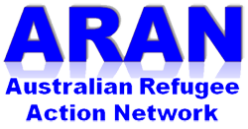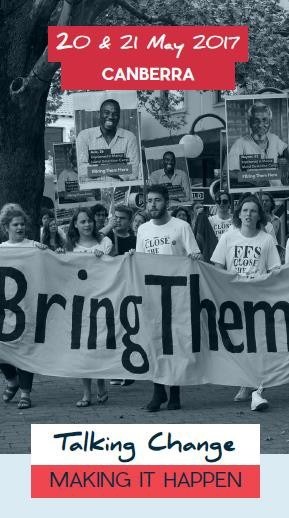Down load the Conference Report – 2017 ARAN Conference Report
2017 CONFERENCE REPORT
Australian Refugee Action Network
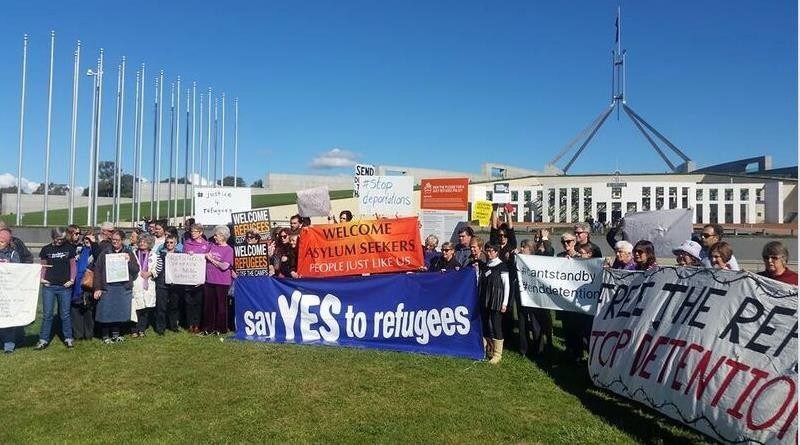 Snap Action & press conference organised by GetUp and supported by ARAN conference delegates in response the announcement of the 1 October Deadline for Asylum Applications May 20 2017
Snap Action & press conference organised by GetUp and supported by ARAN conference delegates in response the announcement of the 1 October Deadline for Asylum Applications May 20 2017
Contents
Links to information on this page:
Background To The Inaugural ARAN Conference
Overview Of The Program
Opening session
Workshop Sessions: Activism and advocacy; what has worked well?
Protest Rallies/ Snap actions/Vigils
Creative activism
Lobbying & letter writing
Developing effective resources to shift public opinion
Getting Media coverage for your actions
Social media – using Facebook & Twitter
How to start a new group / Developing your network
Workshop Session: Activism and advocacy – working in and through constituency groups
National meeting of RAR groups
Faith communities
Using the Creative arts for activism
Grandmothers/ Mothers
Teachers 4 Refugees
Doctors 4 Refugees
Rainbow Refugee Activists meeting
Unionists as activists
University Students/Campus Groups
Towards a common campaign platform: identifying agreed campaign priorities
Panel discussion: approaches to build and strengthen the refugee movement
Proposal for national co-ordination: developing ARAN
Workshop discussion: positives/benefits to member groups
Challenges / Concerns /Questions
What ARAN should be
What ARAN should not be
How should National Committee engage / conduct communication across
the network?
Conference wrap up: suggestions and ideas from the floor re the way
forward together
Election of ARAN National Committee
Attachments
Attachment 1: Initial Publicity Flyer For The Conference – Feb 2017
Attachment 2: Conference Promotion & Program – April 2017
Attachment 3: Conference Program – May 2017
Attachment 4: Groups Represented At The ARAN Conference
Attachment 5: Notes From Conference Workshops
Attachment 6: Notes From Conference Workshops – Working Through the Constituency Groups
Attachment 7: Groups Which Nominated Delegates To Participate In The election Of The ARAN Committee
Background to the inaugural ARAN Conference
The formation of the Australian Refugee Action Network (ARAN) was proposed in late 2016 to promote greater coordination between the many and different groups in Australia working towards a just policy for refugees and people seeking asylum.
The founding members believed that strengthening communication and coordination between ‘grassroots’ groups and organisations would maximize the impact of the many various campaign actions and efforts.
By February 2017, the founding members had established a website, and 24 refugee networks and large membership groups had joined the Network.
A commitment was made to organize a national conference to bring together activists and advocates from across Australia, and to support the further development of the Network.
Notice of the conference was sent to member organisations in February 2017, with further details regarding the program sent in March and April. See conference flyer (Feb 2017) and more detailed conference brochure (April 2017) at Attachments 1 and 2.
Aims and Objectives
The aims of the ARAN Conference were to:
1. Discuss ways to improve communication and co-ordination between grassroots action and advocacy groups in the refugee sector.
2. Work towards establishing a common campaign platform.
3. Share ideas and experience for mobilizing and effective campaigning.
4. Confirm support for the formalization (and election of) a national ARAN coordination committee.
How the Conference was organised
The program
The two-day program was planned to provide various opportunities for sharing and exchange between those attending the conference. The program on the first day focused on campaign activities and strategies, and on the second day the focus on was on process and considerations for formalising the Network. An informal conference dinner was organised providing the opportunity for reflection and further networking.
There was as strong focus on group discussion throughout the conference. Most sessions were introduced by one or more brief presentations, followed by open discussion. The conference program is at Attachment 3.
The Conference Committee
A conference committee was formed in February 2017 by inviting a number of ARAN member organisations to nominate a person for the committee. Meetings were held by skype fortnightly, and weekly closer to the conference to plan and organise the program, and to track progress on registrations and logistics.
The conference committee members were:
John Minns Canberra RAC – Canberra Refugee Action Committee
Linda Cusworth CRAG – Combined Refugee Action Group (Geelong)
Niko Leka HASA Hunter Asylum Seeker Advocacy (Newcastle)
Ruth Jacobs Justice for Refugees SA
Ian Rintoul RAC Sydney
Marie Hapke RAN – Refugee Advocacy Network (Vic) Jan Govett RAR – Rural Australians for Refugees
Caron Molster RRAN WA – Refugee Rights Action Network WA Lili Calitz Amnesty’s Tasmanian Refugee Rights Group
Sandra Bartlett DASSAN
Cassie Magin Australian Refugee Association Inc (SA)
Mark Gillespie RAC Queensland.
The Canberra Refugee Action Committee took responsibly for registrations and all logistics related to the venue, catering, etc. This was a key contribution and the conference would not have been possible without this local support.
Who attended
The conference was moderately priced and open to anyone interested in refugee activism and advocacy. See list of groups represented and attendees at Attachments 4 and 5. Nearly 200 people travelled from all states and territories to attend the conference, including a number of people from refugee backgrounds. The Conference Committee sought financial support from a number of organisations to support the attendance of people from refugee backgrounds, and these included Amnesty Australia, Refugee Advocacy Network, Canberra RAC, Warrnambool RAR, Hamilton RAR, Bega RAR, Susan Varga and Asylum Seeker Resource Centre. GetUp, Refugee Council of Australia and the Brigidine Asylum Seeker Project also provided direct support to assist some individuals.
Overview of the program
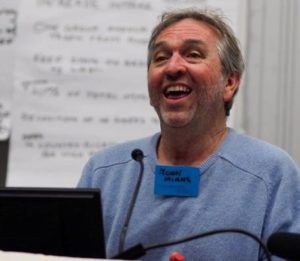
John Minns, Canberra RAC gave an acknowledgment of country, and welcomed everyone to the conference. John highlighted the unique opportunity presented by the conference as the beginning of a more co-ordinated approach to campaigning across the country, with the aim of building and strengthening the movement, so that the push for change can no longer be resisted.
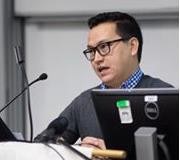
Zaki Haidari, now settled in Canberra Zaki shared his story of arriving here as a young Hazara man seeking asylum. Zaki arrived by boat in 2012, having spent 5 days on a boat which had broken down.
While held in the Christmas Island Detention Centre, he was threatened with the prospect of being sent to Nauru or Manus Island – others with whom he was detained were sent to the offshore camps. Zaki was sent to a detention centre in Tasmania, where people visited and gave a sense of hope. He was later released from detention, and as an 18 year old was living in Sydney with no work or study rights.
Although no longer in detention, having nothing to do, and staying home all day was debilitating. Zaki now has a SHEV (visa) and is living and studying in Canberra, and is a member of the Canberra Refugee Action Committee. He described detention as ‘a jail’, and said “I had no idea that I would not be welcome here”.
Zaki thanked all activists and advocates on behalf of all refugees and people seeking asylum who are still detained or in limbo as a result of the current policies.
Behrouz Boochani, detainee, spoke on video from Manus Island (a pre-recorded message) highlighting the importance of a concerted and more coordinated campaign, and the encouraging us all to do everything we can to bring about the necessary changes in government policy.
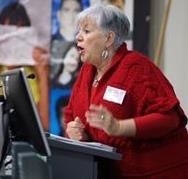
Pamela Curr, long-time activist, advocate and former campaign co-ordinator at the Asylum Seeker Resource Centre in Melbourne reflected on some of the strengths of the movements and some key moments in the refugee movement since 1999.
This year is 25 years since the introduction of mandatory detention, and despite High court challenges, people are still being held in detention – many for long periods of time – on shore and offshore. In 1999 the Woomera camp was set up, where people were held ‘incognito’ in barbarous’ conditions, in tents in the desert. When people were released from these camps they would be bused to Adelaide or Melbourne, and essentially left with no means of support.
This prompted ordinary people into action, and so began the extensive networks of community support. There were a number of protests organised at Woomera and Baxter detention centres, with large number of people and level of media coverage, particular around the Woomera breakout in 2002. This brought the detention centres into the public consciousness, and rapidly built the refugee movement.
The Tampa affair in late 2001 was a pivotal moment which spawned the Pacific solution as the Nauru camp was hastily organised to prevent the people rescued by the Tampa from being brought to Australia. Over the years there have been so many human rights reports, all damning of the policies of detention and deterrence. Advocates and activists have done so much work to agitate for change, and we still have a fight on our hands.
The movement has brought many different kinds of people together, of all backgrounds and ages – all dedicated to making change happen. This diversity is our strength, and also our challenge – to support each other work together in the many and different ways that are necessary to bring an end to the cruel policies which result in so much injustice and suffering.
Brief overview of the Refugee Council of Australia (RCOA) Strategy workshop held 18 May.
RCOA is keen to support stronger co-ordination at national level. Key policy challenges were discussed, including family reunion, asylum processes, offshore camps, regional co-operation. The importance of engaging with the ALP to influence their policy was also discussed.
Workshop Sessions: Activism and advocacy
What has worked well?
Brief presentations and workshop discussions
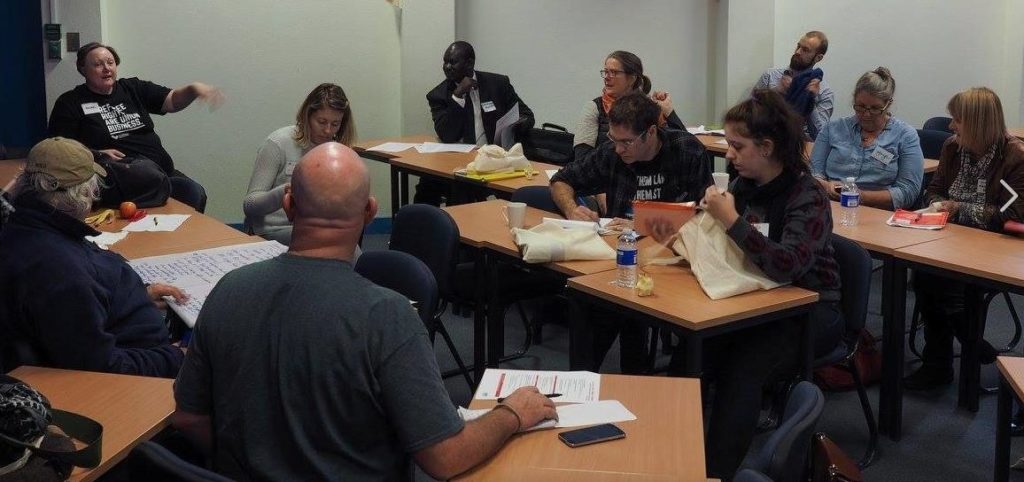
Protest Rallies/ Snap actions/Vigils (see notes section 5A)
Ian Rintoul, Refugee Action Coalition Sydney
Chris Breen Refugee Action Collective Melbourne
Niko Leka Hunter Asylum Seeker Association.
How ARAN could support protest actions:
• National coordination for direct actions
• National Convergences on Parliament House
• Connect to with wider advocacy efforts
Creative activism (see notes section 5B)
Dulce Munoz Mums for Refugees
Fabia Claridge People Like Us The Freedom Tree
Trish Moran Tassie Nannas
Kirrily Jordan Canberra Refugee Action Committee
How ARAN could support creative activism:
• Develop checklist
• Establish an artistic advisory committee
• National fund to support creative artists work (charitable status), process to allocate
• National day of art action
• Creative activism workshop (national)
• National promotion
Lobbying & letter writing (see notes section 5C)
Marie Hapke Convenor Refugee Advocacy Network (RAN): Letters to politicians
Clare Forbes Co-ordinator Grandmothers against Detention of Refugee Children: Lobbying politicians, letters to the Editor
Sam Dariol (on behalf of End Child Detention Coalition ECDC presentation) Project Coordinator, Catholic Alliance for People Seeking Asylum (CASPA ): Lobbying in marginal electorates
Linda Cusworth Combined Refugee Action Group (CRAG): Submissions to Senate Committees.
Ways ARAN can provide support for lobbying politicians and supporting submissions to senate committees:
• Encourage networking to share information to create awareness of policies and Parliamentary bills:
– What bills mean
– Policy research
– New legislation
• Create a letter-writing network (locally and nationally)
• Provide policy comparisons in lead up to next election
• Engage more people in lobbying by sharing ‘how to’ information.
Developing effective resources to shift public opinion ( see notes section 5D)
Ming Yu Hah, Amnesty International Australia: Unbranded resources
Joel Martin-Tribe, ASRC, #Right Track campaign: Use of language
Facilitator: Lili Calitz – Amnesty Refugee Network Tasmania
How ARAN could support effective communication resources
and approaches:

Getting Media coverage for your actions
Michelle Dunne-Breen Canberra Refugee Action Committee & former journalist.
Social media: using Facebook & Twitter (see notes section 5E)
Vivian Harris Queanbeyan RAR: Twitter
Jill Ruzbacky Social Justice Officer Uniting Church Social Justice (Vic/Tas)
Meg Clark Canberra Refugee Action Committee.
What could ARAN do to assist groups with social media?
Central blog on WordPress for ARAN: everyone can share to Facebook and Twitter.
How to start a new group / Developing your network (see notes section 5F)
Jan Govett National RAR (Rural Australians for Refugees) Network
John Minns Canberra Refugee Action Committee.
Ways ARAN can provide support for local groups:
• Assist with networking similar groups
• Providing resources to support actions and advocacy activities
• Sharing info about what others are doing.
Workshop Sessions: Activism and advocacy; working in and through constituency groups
Brief presentations and discussion. See summaries from the workshops
at Attachment 6.
National meeting of RAR groups
Faith communities (see notes section 6A)
Tim McKenna Canberra Refugee Action Committee
Jill Ruzbacky UCA Social Justice Officer Vic/Tas: mobilising church networks Sr Brigid Arthur Co-ordinator, Brigidine Asylum Seeker Project
Love Makes a Way and the Australian Churches Refugee Taskforce
Brenda Hubber Melbourne Catholic Migrant & Refugee Office Catholic Alliance for People Seeking Asylum (CASPA )
Paul Meyer Canberra Refugee Action Committee
Sr Jane Keogh Canberra Refugee Action Committee.
Discussion re the role of ARAN:
• Stronger networking across different groups
• Sharing creative ideas.
Using the Creative arts for activism
Jessica Hackett – The Walk to Canberra, “The Welcome Petition”, and the play, Journey of a Thousand Smiles
Linda Cusworth – CRAG – Presentation on the artwork of Abbas Alaboudi, artist on Nauru, Queenscliff RAR Art Exhibitions, and Freedom Stories – display of information on DVD and Study Guide etc.
Grandmothers/ Mothers (see notes section 6B)
Clare Forbes & Gaby Judd, Grandmothers Against Detention of Refugee Children
Trish Moran– Tassie Nannas
Dulce Munoz – Mums for Refugees
Discussion re the role of ARAN:
• Sharing resources
• Sharing ideas
• Distribution point for information
Teachers 4 Refugees
Lucy Honan Founder Teachers 4 Refugees Teachers as activists
Samuel Dariol Catholic Alliance for People Seeking Asylum (CASPA ).
Fostering awareness and action by school students.
Doctors 4 Refugees (see notes section 6C)
Dr Paddy McLisky Brisbane.
Discussion on how ARAN could support:
• Introduce groups to each other
• Pitch what each group does, in ways that are palatable to that group.
• Medical practitioners are very busy. Doctors 4 Refugees needs admin volunteers
• Create alliances of practitioners (in the legal space as well)
• Films focused on human rights
• Dealing with infectious diseases in offshore camps provides an opportunity for activism through legal representation and risk to individual medical professionals
• Promote coordination between different groups with different expertise, moving from individual cases to policy change.
• Amnesty can link (and is very keen to) individuals to law firms willing to do pro bono work, including OH&S Act issues)
• Activists need to share information with professionals for effect
• Professionals with key information needs to ensure that it moves from desk to action and results
Rainbow Refugee Activists meeting (see notes section 6D )
The meeting was attended by activists from Canberra, Sydney and Melbourne.
Discussion on how ARAN could support:
There was some interest in developing an email network between activists in different states.
Unionists as activists
Tim Gooden Combined Refugee Action Group(CRAG) & formerly Secretary Geelong Trades Hall
Leo Bild Canberra Refugee Action Committee
University Students/Campus Groups (see notes section 6E)
Vanamali Hermans Canberra Refugee Action Committee
Discussion on how ARAN could support:
• Networking could assist in supporting each other’s campaigns, and sharing ideas about how to build membership and different activities.
Towards a Common Campaign Platform: Identifying agreed campaign priorities
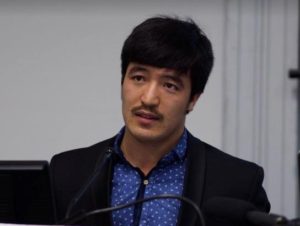
Haji Alizada (Tasmanian Amnesty Group) “Together We Can”
Haji spoke briefly about the importance of us all working together to bring about change. With around 30,000 people on bridging visas, and no certainty about their future, it is vital that we keep up the pressure to change the harsh policies. He also highlighted the stress placed on family members in home countries, many of whom continue to live in danger, and also fear for the wellbeing
of their loved ones in Australia.
He spoke about the power of personal stories, relating his experience of telling his story of being a refugee, and having a 70 year old stand up in the audience and say “I have been a racist and hated refugees all my life, but this has changed everything”. He concluded with the statement “No-one was born to hate another person”.
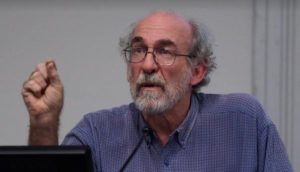
Ian Rintoul Sydney Refugee Action Coalition
Having been involved in the refugee movement for many years, Ian shared some reflections on the commonality between the many and different activists and advocacy groups represented at the conference. As a political movement, though not party political, the refugee movement needs to influence the political process.
“We have been the people who have stood up and spoken out against the policies – it’s in the news because we have been active”. Ian noted that while achieving total policy change is our goal, it is a very big task.
The strength of the movement is that people are taking action in lots of localities and settings. There is value in us all pulling together – “it takes many tributaries to make a big river.”
The movement needs to be able to respond to issues in a coherent way. A set of demands are the political ‘glue’ to unite the campaign, and to signal the common issues.
There is a lot of commonality across the movement in terms of the issues we are all concerned about.
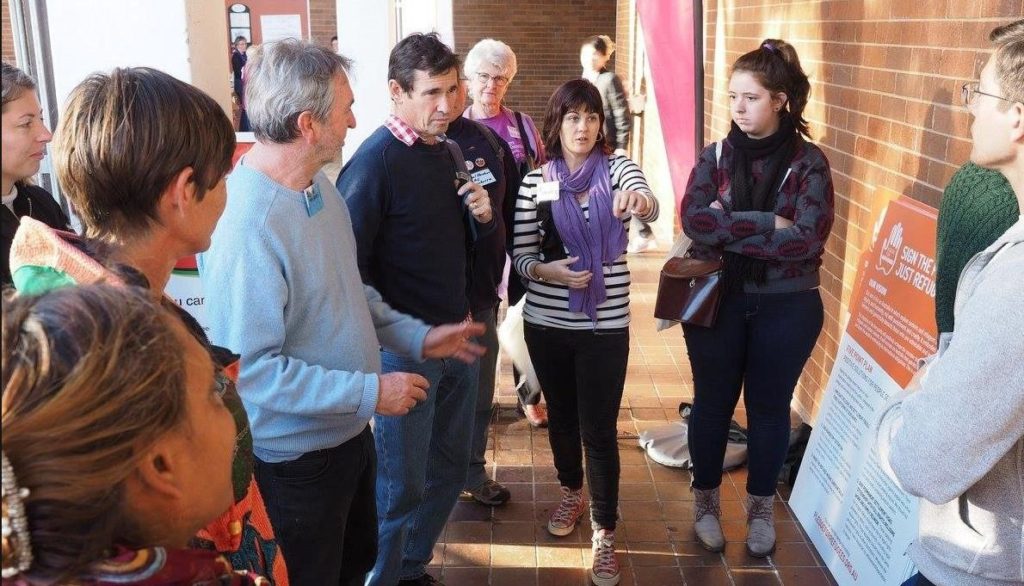
World Café discussion
Conference attendees circulated through different discussion points to consider key issues and demands in relation to:
• Detention
• Processing of asylum claims
• Boats/ On-water operations
• Visas and Entitlements
• Family Reunion (could be included under visas and entitlements)
• Refuge Intake
• Regional Approach /Cooperation
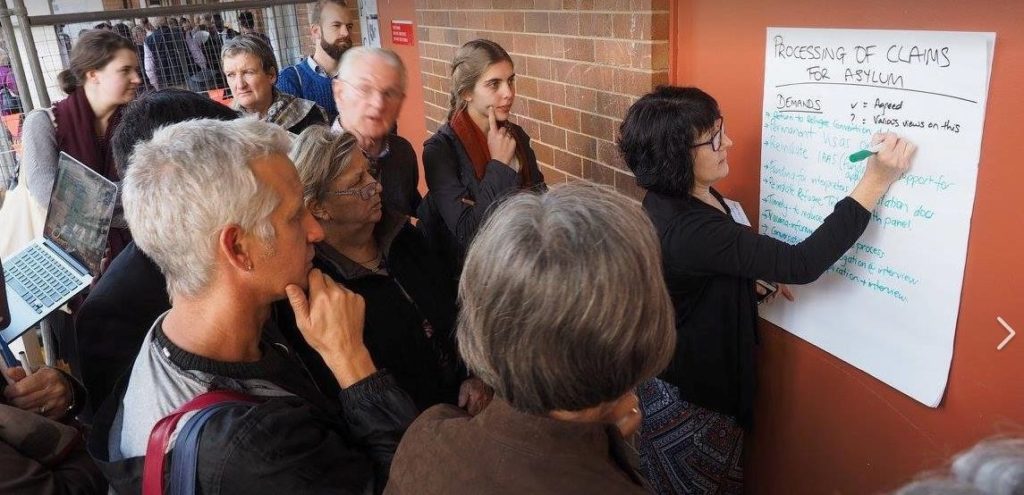
There was broad agreement on the following:
No mandatory detention
Mandatory detention, both on and offshore, for people seeking asylum violates human rights and must be prevented by legislation. People arriving as asylum seekers must be supported in Australian communities while their claims for refuge are being assessed.
A more generous intake
Australia’s refugee intake must be significantly increased in response to global need, and must not discriminate against particular people groups. People should not be denied resettlement on the basis of mode of arrival.
Australia’s refugee intake must be significantly increased in response to global need, and must not discriminate against particular people groups. People should not be denied resettlement on the basis of mode of arrival.
Fair processing
Refugee assessments must be based on the UN Refugee Convention. The process must be fair, timely, accessible, informed, sensitive and funded. Appropriate avenues for independent and judicial review of decisions must be available.
Access to work, support and permanent residency
Access to work, education, health and support services, English classes and income support must be afforded while claims are being assessed. Permanent residency visas, with clear pathways to citizenship, must be granted to those found to be refugees.
Family reunions
The Refugee Convention right to family reunification for refugees must be upheld. Families must be reunited in a timely manner to prevent prolonged separation.
Safe passage
Australia must work with the UNHCR and transit countries in our region, to provide resettlement in Australia for a significant number of refugees, thus providing safe passage as a real alternative to unsafe boat journeys.
No boat turn-backs
Boats must not be turned back. People must not be refused the right to seek asylum due to their mode of arrival. Rescue services must be provided.
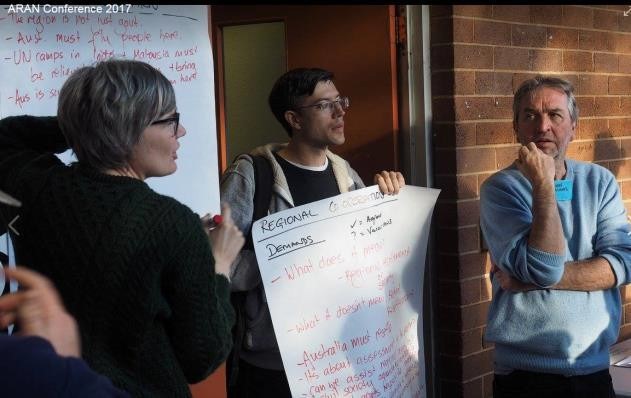
Panel Discussion: Approaches to build and strengthen the refugee movement
Facilitator: Linda Cusworth Combined Refugee Action Group
Laura Stacey Refugee Council of Australia
Recent opinion polls suggest that 72% of people would support people from Nauru and Manus Island being brought here. Key things which need to happen in the refugee movement:
• Need to present alternatives that are more persuasive than the government’s policies
• We need to come together and agree on what we can work together on
• Working across electorates to influence political MPs and parties.
Shen Narayanasamy GetUp Human Rights Director
GetUp is best at organising mass action around critical moments – examples include the vigils around Syrian refugees, the #Let Them Stay campaign, and We Can do Better.
18% of people in Australia are people of colour.
• We must address racism.
Zaki Haidari Canberra Refuge Action Committee
Policies are designed to punish people who arrived here by boat. For example, the waiting times before family reunion might be a possibility; 3 years on a SHEV visa, plus 5 years on a Skilled Visa before becoming eligible for family reunion.
• The refugee movement needs to change people’s perceptions about the issues and build understanding of the circumstances for people seeking asylum – this will build the support for policy changes.
Jan Govett National Co-ordinator, Rural Australians for Refugees (RAR)
Jan spoke briefly about RAR: RAR was strong in the early 2000’s but by 2007 the networking and information flow between RAR groups stopped ( as did many advocacy groups with the Rudd Government introducing more compassionate policies). Jan joined RAR in 2011, while living in Maryborough, where a local RAR group was looking for members. Now there are over 90 RAR groups across Australia.
The key has been networking and information sharing between the groups. The refugee movement needs to do this more widely:
• Networking and information sharing between the groups
• Imagine a RAR or other group in every town and suburb ! Think about how you could initiate a group.
• We need to realise that everyone can contribute, and work out how this can work best.
Sandra Bartlett DASSAN (Darwin Asylum Seeker Support and Advocacy Network)
Sandra mentioned the research on the ‘group think’ (the idea that people follow the crowd, and often do not develop their own ideas). An exhibition about refugee supporters has been successful in demonstrating the diversity of people who support refugee rights. We need to break down the idea that ‘good things happen to good people’, and ‘bad things happen to bad people’.
We need:
• Leadership positions for people with lived refugee experience
• Conversations about alternative policy options
Chris Breen Refugee Action Collective (Victoria)
The Coalition government has invested so much in not having people come here:
• We need to reach out to other communities/groups – eg unions ( 2 million members)
• Appeal to the ALP voter base – exploit ‘cracks’ in the ALP support for coalition approach – get ALP politicians to speak out.
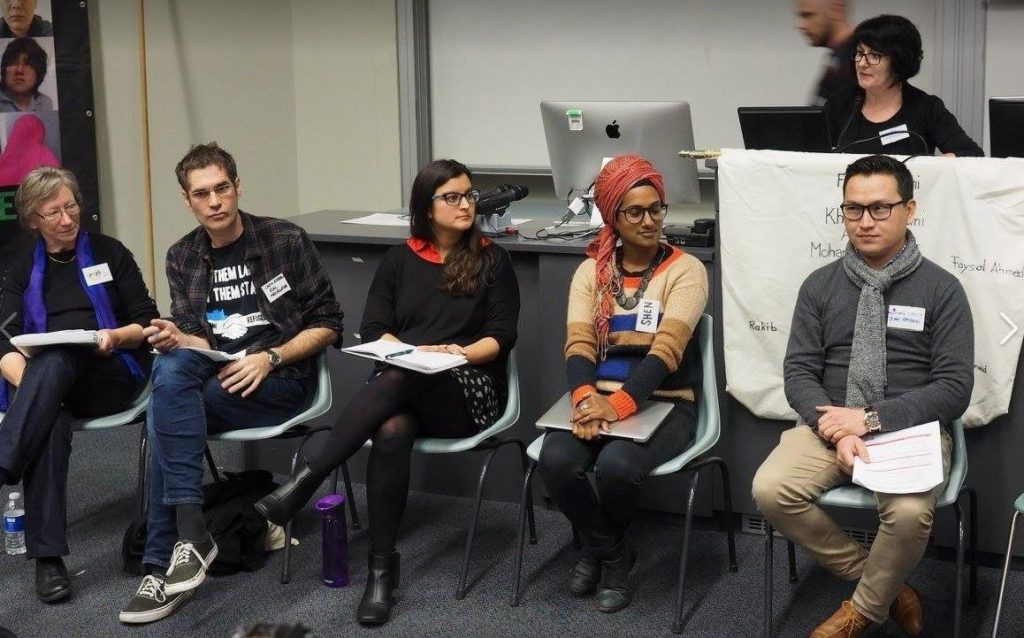 L-R : Jan Govett, Chris Breen, Laura Stacey, Shen Narayanasamy, Zaki Haidari (Sandra Bartlett out of shot) , Linda Cusworth facilitating
L-R : Jan Govett, Chris Breen, Laura Stacey, Shen Narayanasamy, Zaki Haidari (Sandra Bartlett out of shot) , Linda Cusworth facilitating
Conference Dinner at local Thai restaurant
Day Two
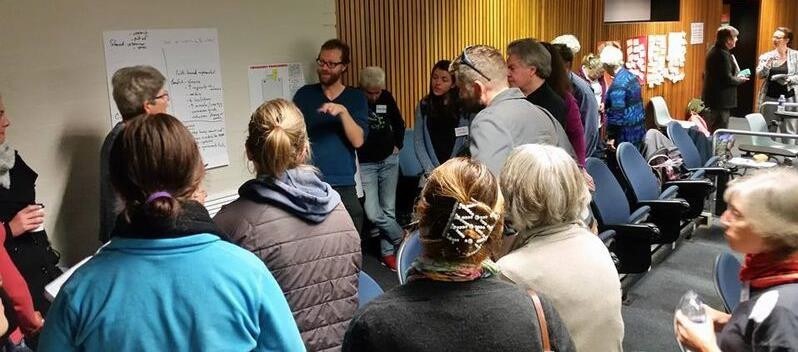
Proposal for national co-ordination – Developing ARAN
John Minns & Jan Govett
• Background to ARAN
• Overview of proposal for Committee including draft terms of reference
During this session, we recorded thoughts on butcher’s paper about the role, structure, benefits, concerns and the workings of the proposed ARAN network and committee.
Workshop discussion: Positives/Benefits to member groups
• Sharing resources ; Access to well-researched materials; Clearing house for resources eg: legal advocacy, other bodies; pooling resources; source of information and resources
• Able to commission research and pull information/data together to give a national picture, commission and collate research, seeking out empirical evidence for policy advocacy ; research for advocacy;
• Sharing ideas and knowing what others are doing, more creativity, not reinventing the wheel
• More power/leverage ; increased capacity to achieve; achieving strategic agreed goals
• National media releases; getting more media;
• Develop common goals and national voice, bigger voice; combined voice to pollies and public
• Clearer point of contact nationally, having a hub
• Quick response to serious events; perhaps establish an emergency response team to propose actions and responses
• Coordinating national actions
• National support for local campaigns, amplifying local actions
• Lobby government and advocacy for collective interests
• Helps groups to also look at bigger picture aside from their immediate activities
• Support capability building of members of ARAN, training opportunities ?
• Offer community education and on refugee experiences
• Reduce the isolation experienced by smaller groups
• Empower groups – increased morale and energy – sharing the load
• Stronger sense of cohesion across the movement.
Challenges/Concerns/Questions
• Resourcing/finances:
– Resources needed for ARAN, how will it be funded? Source and mechanism
• Tech:
– Funding needed for IT systems
– Simplifying the complexity of web demands
– Need to take advantage of latest technology
– Need to be conscious that there is a wide range of technical abilities
across groups
– Website – and other social media
• Need to have people of refugee backgrounds central to ARAN
– Lived experiences to be heard and valued
– Refugees need to be on the committee ; guaranteed positions for people with
lived experience as refugees, Quota for representation
– Skype (or other communication) from Manus and Nauru
• Need to have young people central to ARAN
• Will ARAN be incorporated? What about umbrella insurance?
• If a group does not agree with an ARAN press release, how to handle
differences? How is policy to be developed on contentious issues that not all
member groups agree with?
– Eg: media releases: who decides what should be said
• Accountability and transparency:
– Decision making processes need to be clear
– Risk top-heavy conversation
• Managing different expectations that different member groups will have of
ARAN
– Recognise diversity of capacities and focus areas
• When sharing resources, they need to applicable to RAR as well as city groups
• Possibility of information overload;
• How will ARAN works/engages with other networks and wider movement, eg: Amnesty, GetUp, RCOA, NGOs
• Sustaining administrative work to conduct ARAN:
– Social media, website, etc, ‘clearing house’.
• Size of committee: watch that coordinating committee doesn’t expand beyond 12 – unwieldy size and effect on co-ordination.
• Risk that grassroots groups relax
• Concern: derailed by infighting; will need constant focus on collaboration
• Should keep an eye on groups who feel discourage… help them
• How will committee communication and engage with ARAN member groups?
What ARAN should be
• Key values: Responsive, Respect, support and trust , Manageable, Visible
• Providing resources to support activities of member groups:
– List of resource people
– Develop national positions common to all groups
– Linking to particular supports or resource : eg: Lawyer advice, IT
– Networking & connecting groups
– Website ;message board
– Pool merchandise: bumper stickers, t-shirts, online resources
eg: start up guidelines
– Learning and exchange between groups – Keep everyone informed
– Training for leadership of groups (provide resources): ideas, forums, media response, IT training
• Autonomy of groups
– Enabler not director
– Seek out and share suggestions about campaigns
– Coordinating, not taking over
• Make up of network:
– Seek out new groups
– Have a clear process for other small groups to join up and participate
– Safe and inclusive
– Diverse
– Spread of states, politics, faiths, cultures
– Volunteers to be invited to support ARAN work
– Maintain the foundation of the movement as a volunteer movement
• Transparent
– Information sharing and consultation widely with members
– Maintain accountability
– Annual auditing of accounts for transparency
– Democratic: majority consensus; committee membership
– Clear processes for how new groups join; for responses to urgent actions; how policy is to be developed on contentious issues
• Visitation of ARAN to all refugee forums, eg conferences/meetings and refugee
destinations and camps.
What ARAN should not be
• Dictatorial
• Authoritarian
• Egotistical
• Trying to do everything
• Directing
• Service provision – need to focus on Advocacy
• Not too big
• Not a news service
• Not re-inventing the wheel.
How should national committee engage / conduct communication across the network?
• Do not underestimate the huge effort to keep connecting with every group
• Role of Committee:
– Committee needs to have communication skill/focus
– Committee members are not representing their group, but represent ARAN
– Role of committee includes engaging with other networks
– Facilitating national working groups, eg: social media, creative activism
– Committee retains flexibility to allow for emerging issues
– Make sure Committee stays on track and responsive to group inputs
• Meetings:
– Prior notice of meetings – time for contributions from groups
– Agendas to be set in time to get input from groups
– Records of meetings to go to each group
– Meetings to be minuted and minutes available in a shared database
– Minutes on website (members only)
• Communication with groups:
– ARAN member groups need to pass on information through their membership
and networks
– Purpose determines type of communication
– Adequate lead time on potential forums where possible, eg: 4th anniversary
Nauru
– Clear process for urgent communication
– A strong ‘up mechanism’ for sharing ideas is critical
– Representatives accessible
– Regular reporting – mechanism clear and accessible
– Newsletter from ARAN to all individual groups
– Wheel spoke communication in and out
– Awareness of where we do and do not have members and attempting to create
links and contacts there.
– Particular focus on communication with the western and central state
groups;
Exploring options for geographical representation, and to present to next
conference (WA, SA, NT, Tas); Individual committee member to take
responsibility for communication with remote and for regions
– Use IT Systems
-Must maintain grassroots links
Conference Wrap Up
Suggestions and ideas from the floor on the way
forward together
• Establish a national media network. Perhaps a closed Facebook page for people
who are the media contacts for their groups
• Investigate national incorporation and insurance
• Establish a national letter-writing group. Send dot points for letters out from ARAN so that all groups can use
• Committee could provide information so that people can take it up locally to
lobby politicians
• Establish and maintain strong ARAN links with RCOA, Amnesty and GetUp so
that info is shared readily
• Former workers from offshore detention centres could use Comcare with OHS
issues to bring the system down
21
• Break down artificial barriers between activist groups and service
provider groups
• Beware of rumours re other groups and their activities
• Artists joining forces to replicate creative actions in other areas
• Email lists were developed in some of the small groups so that people can keep
in touch and work together
• Tap into the resources in the wider community (Committee can’t do everything)
• Maintain a website with resources from all groups and a list of current
events and actions
• Collaborate to tap into rural networks to get support for actions and build
them nationally
Election of ARAN National Committee
31 ARAN member organisations provided delegates to elect the ARAN Committee.
There were 17 candidates for election. Each gave a brief presentation on why they were standing for election to the committee. A decision was taken in the session to open 8 places for election, and enable the Committee to co-opt up to 4 additional committee members.
The way the votes fell meant that numbers 8 and 9 received the same number of votes, and both were invites to stay for the spring.
See list of delegates and candidates at Attachment 8.
Committee members elected were:
John Minns Refugee Action Committee Canberra
Pamela Curr Brigidine Asylum Seeker Project
Margaret Rasa Rural Australians for Refugees – National
Caron Molster RRAN(Refugee Rights Action Network)
James Supple Refugee Action Coalition (NSW)
Marie Hapke Refugee Advocacy Network
Linda Cusworth CRAG ( Combined Refugee Action Group)
Lili Calitz Amnesty Refugee Network
Amir Javan People Just Like Us
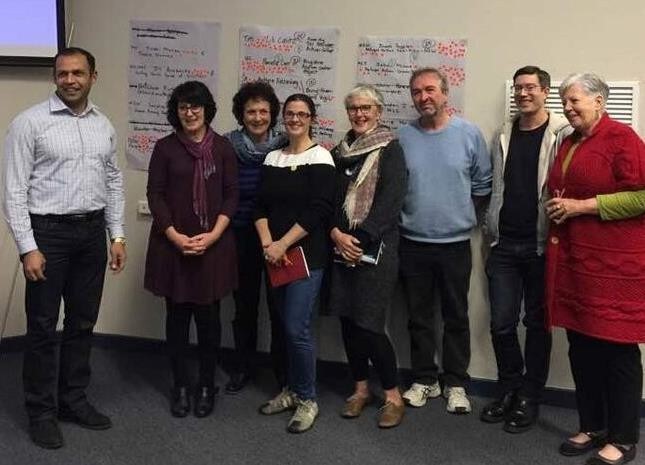
The Inaugural ARAN Committee elected 20 May 2017.
L –R: Amir Javin, Linda Cusworth, Marie Hapke, Lili Calitz, Margaret Rasa, John Minns, James Supple, Pamela Curr. (Caron Molster elected in absentia).
Attachments
Attachment 1: Initial Publicity Flyer For The
Conference – February 2017
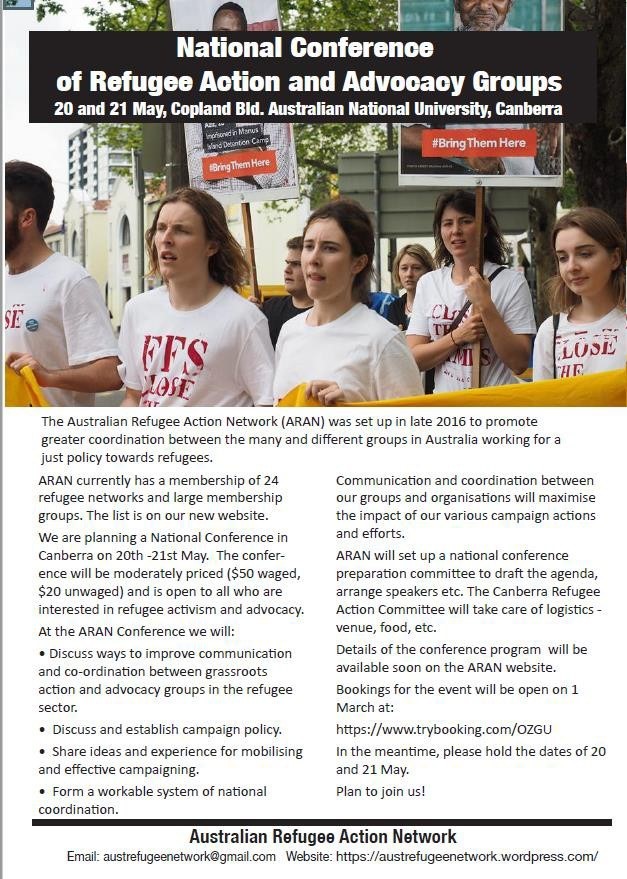
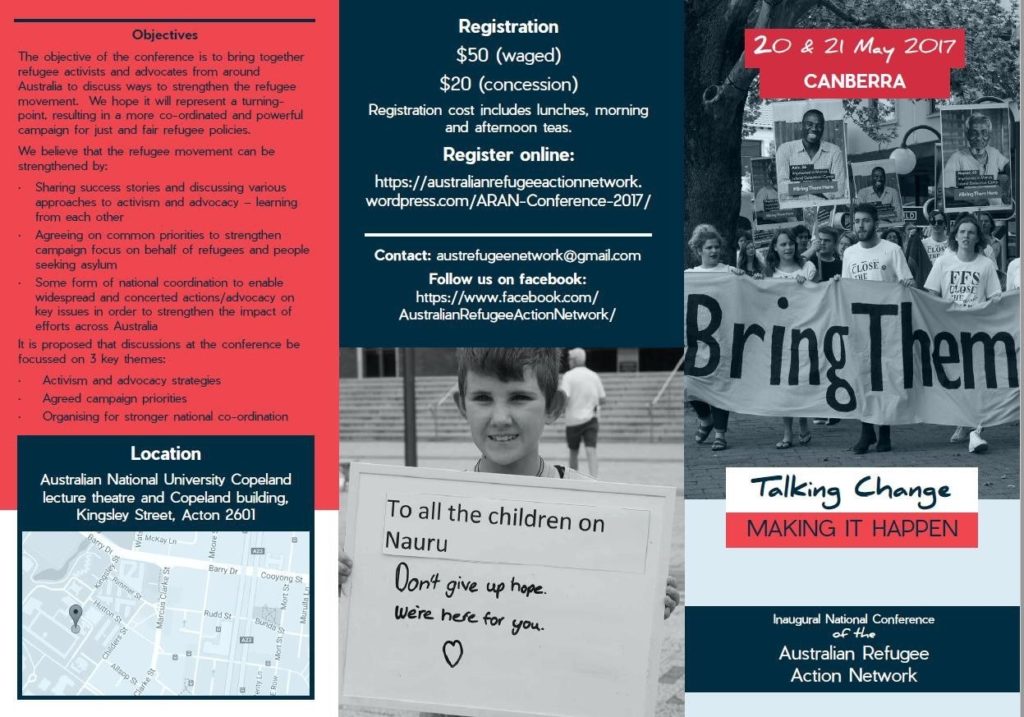
Attachment 2: Conference promotion & program April 2017
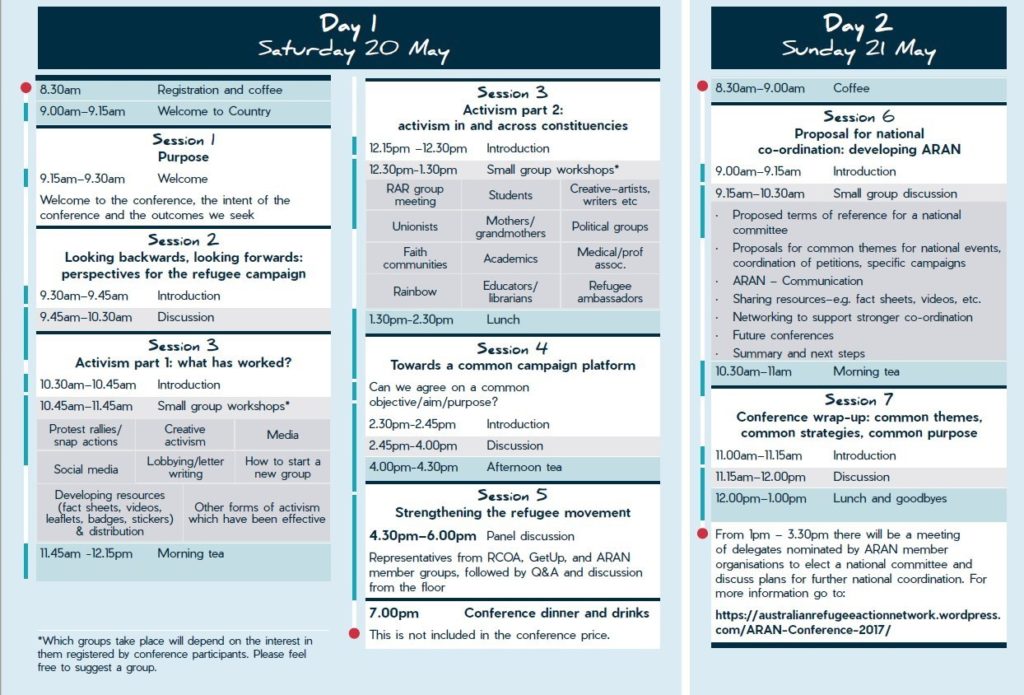
Attachment 3: Conference program May 2017
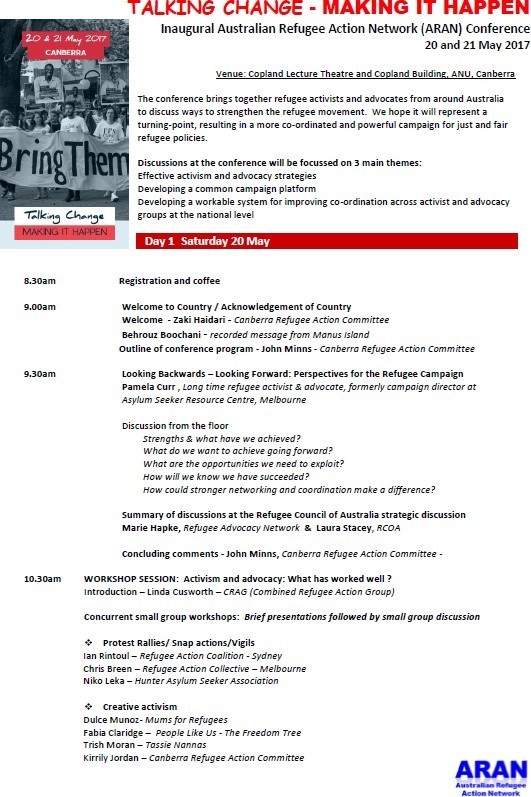
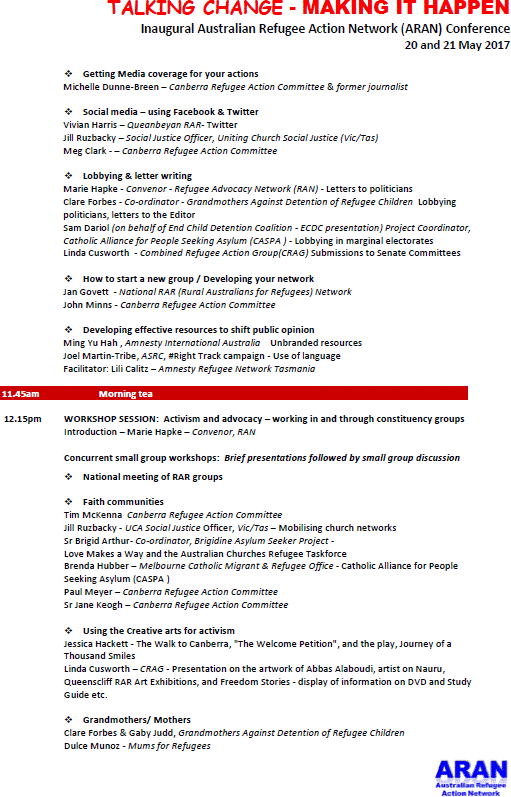

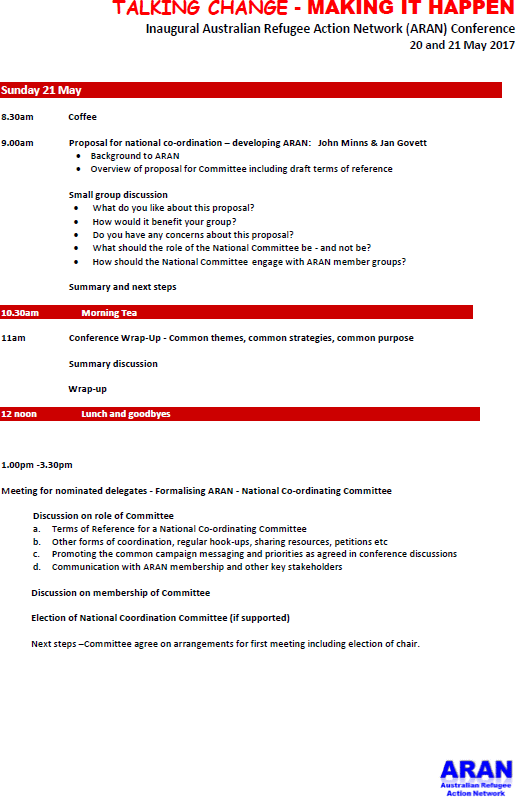
Attachment 4: Groups represented at the
ARAN conference
ACT Hazara Community Inc.
Adelaide Bringing it Here Vigil
Amnesty International
Amnesty International Refugee Rights Group Tasmania
ANU Refugee Action Committee
Asylum Seeker Resource Centre
Brigidine Asylum Seekers Project
Canberra Quakers
Canberra Refugee Action Committee
Catholic Alliance for People Seeking Asylum (Jesuit Social Services)
Centre for Human Rights Education, Curtin University
Circle of Friends 111
Close the Camps Action Collective
Combined Refugee Action Group
Currently establishing Northern Victoria Refugee Support Network.
Darwin Asylum Seeker Support and Advocacy Network
Doctors For Refugees
Faith Based Working Group, RAC ACT
FILEF, Federation of Italian Migrant Workers
GetUp
Gifts For Manus and Nauru Incorporated
Grandmothers against Detention of Refugee Children
Grandmothers Against Detention of Refugee Children NSW
Home Among the Gum Trees NSW
Hunter Asylum Seeker Advocacy
Independent and Peaceful Australia Network
Justice for Refugees SA
Killester College
Love Makes a Way
Mansfield RAR
Manus Emergency Fund
Melbourne Catholic Migrant & Refugee Office
Mid North Coast Refugee Support Group Inc
Montmorency Asylum Seekers Support Group
Mums4Refugees
National Tertiary Education Union
People Just Like Us
RAC Canberra – Faith Based Working Group
RAC Qld (Refugee Action Collective Queensland)
Rainbow RAC
RAR Castlemaine, Vic
RAR Queanbeyan NSW
RAR Southern Highlands
RAR-Euroa
Refugee Action Coalition (Sydney)
Refugee Action Collective (Victoria)
Refugee Action Collective Eurobodalla
Refugee Action Collective Illawarra
Refugee Advocacy Network
Refugee Communities Advocacy Network Victoria
Refugee Council of Australia
Refugee Rights Action Network Fremantle
RISE
Rural Australians For Refugees, Bendigo
Rural Australians For Refugees – National
Tamil Refugee Council
Tassie Nannas
Teachers for Refugees
The Community of South Sudanese and Other Marginalised Areas (CSSOMA)
The QUO Australia
UCA Synod of Vic/Tas
University of Canberra
Vintage Reds of Canberra
Vittoria Pasquini (VDS Association)
We Care Nauru
Yass Rural Australians for Refugees.
Attachment 5: Notes From Conference Workshops
– Approaches to activism:
5A. Protests & snap actions
5B. Creative Activism
5C. Lobbying and Letter writing
5D. Effective advocacy resources and communication 5E. Using Social Media
5E. Workshop Notes: Social Media
5F. Building networks / starting new groups.
5A. Workshop Notes: Protest Rallies / Snap Action /Vigils
Goals:
• Shift public opinion
• Build confidence in the refugee movement
• Empower people
• Involve different organisations
More actions needed – we need to be bolder
• Force the hand of the government
• Shut down business as usual
• Blockade Immigration Department
• Encourage organisations to:
– Cancel contracts with Wilson Security
– Target NGOs providing service to Nauru/Manus
• Raise community awareness
– Leafletting
– Unions
– Stronger if bigger numbers – 15,000 to 200,000.
Involve refugees every step of the way.
Has to be connected with the wider movement Reclaim links with the migrant population National coordination for direct actions.
Need approaches that suit all people Link with International Organisations.
Direct Actions
• Civil disobedience – need training sessions
Nation-wide vigil / protests
• 4 year anniversary – Manus and Nauru
• Silence can also be a useful tool.
Rallies:
• Convergence groups marching together at beginning of rally
• National Convergences on Parliament House
• Villawood blockade
• Big rallies support smaller actions Snap actions and vigils can be very powerful.
5B. Workshop Notes: Creative Activism
• Tension between local action and national action. Need both, link both.
• Need wit, boldness and surprise
• Actions that are non-threatening, soft
• Do not underestimate the “power of one”
• Link to iconic national emblems
• Actions that make people think
• Keep in mind ethical considerations when developing campaigns
• Actions that relate to emotion can be very effective
• Consult with refugees in developing and delivering creative action.
Purpose of using creative approaches to activism:
• Break down stereotypes and barriers
• Telling stories – empathy
• Relate to own experience
• Therapy.
Angles:
• Compassion
• Human rights
• Economic.
Important to consider:
• Ensure ethical considerations: ensure refugees in messages/delivery. Checklist; ensure confidentiality
• Engaging with First Nations.
How ARAN could support:
• Develop checklist
• Establish an artistic advisory committee
• National fund to support creative artists work (charitable status), Process to allocate
• National day of art action
• Creative activism workshop (national)
• National promotion.
5C. Workshop Notes: Lobbying and Letter Writing
Letter Writing
Reasons for letter-writing:
• Engages more directly with politicians
• Every letter that is received is counted as an indicator of the population
which is in support of that view
• MPs care about votes
• MPs want to be seen to be reasonable
• If we don’t contact MPs to voice our views, then they can assume that we
agree with what they are doing
• Provides MPs with more information about the issues than they
would otherwise be aware of.
Who to write to:
• Local MP
• Senators for your state
• Cross bench Senators who may decide the vote for or against legislation
• Ministers
• Shadow Ministers
• PM
• Opposition Leader
See: http://www.aph.gov.au/Senators_and_Members/Guidelines_for_Contacting_Senators_and_Members.
When to write:
• Constant, steady drip is helpful (start a letter-writing group!)
• Write in response to events and decisions
• Write in regard to proposed legislation
• Write to express support and encouragement when politicians do take a stand.
What to write:
• Open with something about yourself in order to personalise yourself as a voter in the electorate
• Provide your view on a particular point
• Propose some realistic alternatives to the current problem.
How to write:
• Doesn’t have to be formal and eloquent
• Keep it clear and concise (can be just a paragraph or two)
• Stick to one issue, with a couple of points on that issue
• Paper typed letters, handwritten letters, cards, postcards and emails
are all useful
• Be polite and reasonable
• Emails should be individually addressed; don’t bulk mail
• Ask questions
• Provide dot point info for your members to base their letters on
• Write up individual short letters for people to add their signatures and
details to, then send for them.
Remember:
• Expect no reply, or a disappointing, form letter reply. The reply is not
important. The fact that you registered you opinion is.
• Don’t expect to change a politician’s mind by your letter. They will stick to
party policy. But if enough letters disagree with it, they will start to question
support for that policy.
• The total volume of letters matters, not the length of each letter.
Meetings with Politicians
• Call their office to request a meeting. Keep calling until you get one
• Create dialogue and conversations, rather than taking adversarial approach
• Appeal to their desire for votes
• Build relationships with staffers
• Get info on individual politicians so you know how best to approach them
and what angle to take
• Talk to politicians on their terms
• Give de-identified case studies, so that they know how the policies affect
real people Submissions to Senate Committees
• Keep an eye on current bills at
http://www.aph.gov.au/Parliamentary_Business/Bills_Legislation/Bills_before_Parliament
• Bills for proposed legislation are often sent to a Senate Committee for
discussion at http://www.aph.gov.au/Parliamentary_Business/Bills_Legislation/Bills_and_Committees/Bills_r eferred_to_Senate_committees
• Anyone can make a submission to the Senate Committee (individuals
and groups)
• Write a short statement of concerns about a particular bill (RCOA website will
often have information on current bills on its website) and submit it at
http://www.aph.gov.au/Parliamentary_Business/Committees/Senate/Making_a_submission
• Ask your group members to write letters / send emails to all Senators for your
state, and cross bench Senators, based on this statement
• Target Senators who haven’t declared their position
• Call Senators offices and request a meeting with your group (can do by
teleconference, and can meet with their legislative advisors) to outline your
concerns about a bill
• Give de-identified examples of the impact the legislation will have on real
people End Child Detention Coalition
• Ask your MP if they support the detention of children
• End Child Detention is keeping a record of those who support it and those
who oppose it
• Target marginal seats in the lead up to the next election
• Demonstrates public opposition in marginal electorates
https://endchilddetentionoz.com/the-solution/take-action/.
Ways ARAN can provide support for lobbying politicians and supporting submissions to senate committees:
• Encourage networking to share information to create awareness of policies and Parliamentary bills;
– What bills mean
– Policy research
– New legislation
• Create a letter-writing network (locally and nationally)
• Provide policy comparisons in lead up to next election
• Engage more people in lobbying by sharing ‘how to’ information.
5D. Workshop Notes: Effective Advocacy Resources & Communication
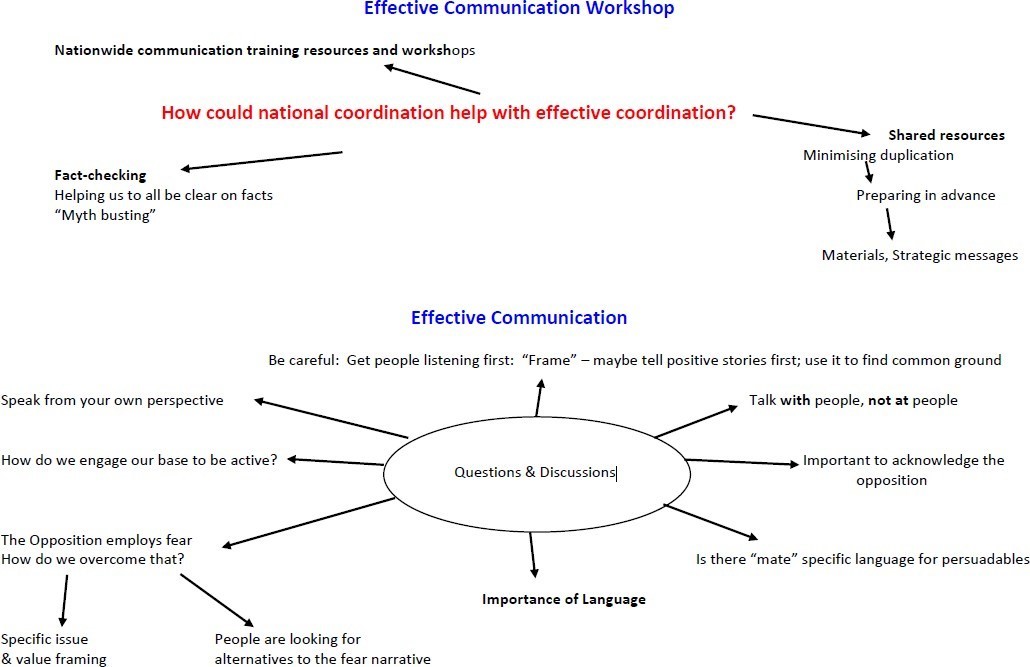
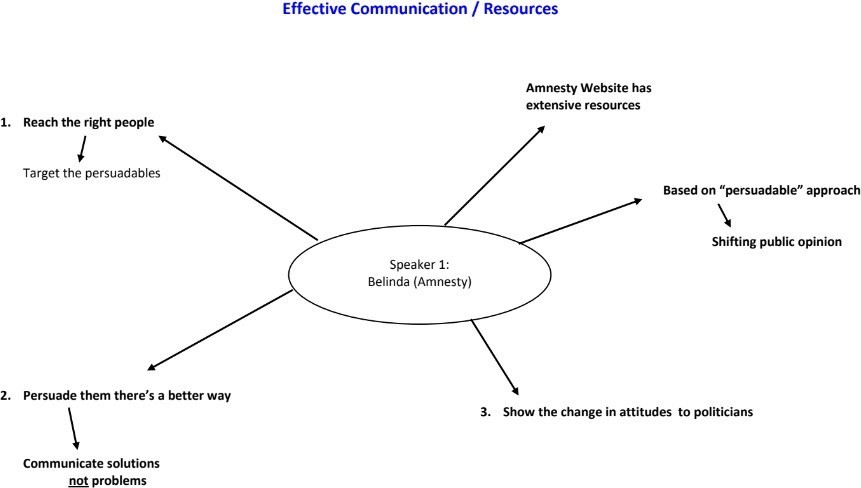
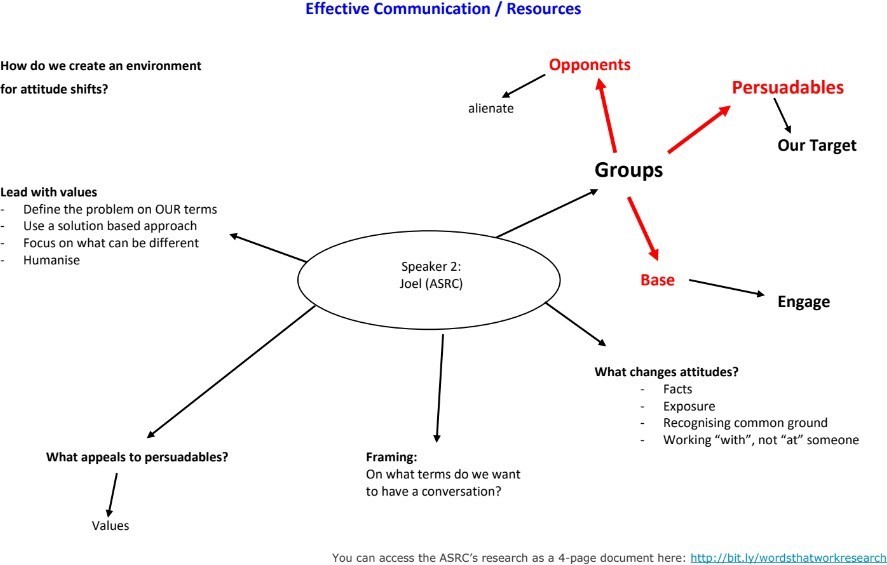
5E. Workshop Notes: Social Media
Training in using social media: Your local library, Youtube.
Twitter:
1. Find someone influential, eg: Berooz B, Jane Salmon, and click on the list of people they follow
2. Mainstream media use tweets to keep up to date
3. Tweet during the event – immediacy
4. Retweeting is fine.
Facebook:
1. Liking and sharing important for strength
2. Paid advertising expands your sphere of influence. Can attract negative comments – can be positive
3. Best times to post: 3:15pm weekdays (school pick up time): like and share; 7-8am: best times for action (commuters). Saturday 3pm: Faith groups
4. Handling negative comments:
1. Delete if obnoxious.
2. Leave it up; it will eventually sink to the bottom.
3. Other members of the group can respond.
4. Make it clear you’re not open to debate.
5. Pictures are more attention-grabbing. Videos better still.
6. Choosing content: Herald Sun test; do I want this to be on the front page?
What could ARAN do to assist groups with social media?
Central blog on WordPress for ARAN: everyone can share to Facebook
and Twitter.
5F. Workshop Notes: Building A Network / Starting A New Group
Building a Network across various discrete groups: builds strength & numbers, and enables:
• Fast response
• Communication
• Cooperation
• Collaboration.
Success factors: use and share resources, don’t reinvent the wheel, learn from others.
Starting a New Group: need a core group to begin; maybe small numbers, but need to be committed. Hold a Public Event.
• Make list of attendees
• Invite refugees, people seeking asylum, people of lived experience Follow-up is crucial
• Hold a meeting within 2 weeks
• Discover people’s interests / abilities / experience
• Bring people into the discussion
• Allocate responsibilities.
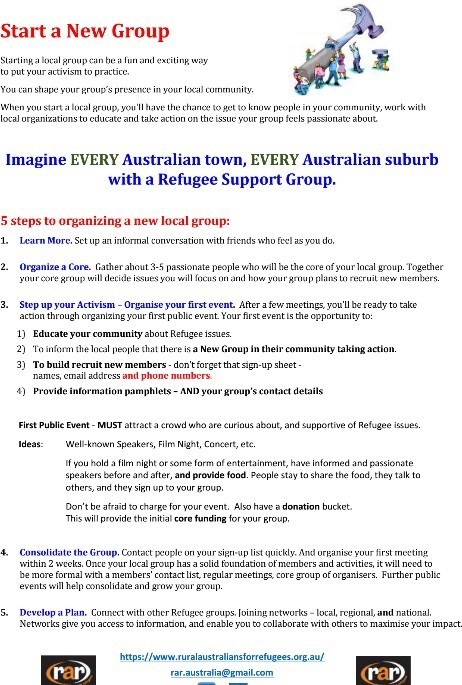
Attachment 6: Notes from conference workshops
– Working through constituency groups:
6A. Faith based groups
6B. Grandmothers Against the Detention of Refugee Children
6C. Doctors and other professionals
6D. Rainbow Activists meeting 6E. University campus groups
6A. Workshop Notes: Faith Based Groups
Muslims for Progressive Value. Omar:
• Haven’t been that active, not for theological reasons, but because many
Muslim people don’t want to get involved in political issues
• Support existing groups with rallies and fundraisers
• Conversations with Muslims held regularly
• Involved in a faith-based working group after being invited.
Canberra RAC Faith-based Working Group:
• One of many groups which form Canberra RAC
• Consists of reps from main Christian denominations, Jewish and Muslim organisations
• Play a big role in the Palm Sunday rallies
• Breaks down barriers
• Involved in Sanctuary Movement
• Large banners at the front of various houses of worship
• Faith leaders play key roles in vigils
• Provide music
• Mailing lists promote events and each other’s initiatives
• Share resources
• Support men on Manus
• Involved in SIEV X Memorial.
Love Makes a Way. Sr Brigid Arthur:
• Justice and compassion in all faiths, not just Christian
• Many faiths other than Christian involved. All faiths working together
• Some Christians are not interested in justice or compassion. Some Christian groups want compassion for Christians only
• We have long traditions to draw on. Gives us a lens to see. Stories from our traditions are useful. E.g. Jesus in the temple (civil, political and ethical)
• Emphasis on civil disobedience in the tradition of Ghandi and Martin Luther King Jr.
• No violence.
Australian Churches Refugee Taskforce:
• Sanctuary Movement
• Involved in No Business in Abuse campaign
• Submissions to Parliament.
Uniting Church Social Justice Unit: Jill Ruzbacky
• Young church formed in 1977. Has prophetic function.
• Diversity is strength
• We’re better working together
• Ecumenical groups
• Focus on what we have in common
• Petitions, marches, rallies
• Community education
• Help people to join the dots with social justice teaching
• Use what you’ve got (eg. Used tennis to get to speak with Federal Member for an hour).
Catholic Alliance for People Seeking Asylum. Brenda;
• Came out of Jesuit Social Service
• Running community action training
• “Engage Hearts and Minds” Toolkit
• Circles of Silence – flashmob?
• Faith-based groups are good at singing, hospitality, treating people equally
• Running community conversations in faith communities
• Give people confidence to approach politicians
• Repeated actions
• Prayer service before Palm Sunday
• Maybe pick two or three events which we could do as joint solidarity activities How do groups work together?
• In Melbourne, all faith-based groups are part of Refugee Advocacy Network and involved in Palm Sunday Justice Walk; organised workshops together for Refugee and Migrant Sunday; support Refugee Action Collective actions on World Refugee Day
• Manus Lives Matter – get people linked to the situation
• Use what people are good at (e.g. justice, charity)
• Kitchen table conversations to get people motivated
• In Sydney, Table Talks tailored to faith groups; signed bookmarks to politicians How do we have more impact?
• Keeping on doing things is important
• We’ll never know what will cause the change
• Sometimes one-off events are influential (e.g. LMAW with Bill Shorten)
• We need creativity (e.g. carols with the words changed)
• Churches have a reputation for making a difference
• Value of working together
• We need all types of activities – don’t underestimate silence
• Spread the word
• Using sacred texts to support our cause
• Need stepping stones and pathways for people (e.g. sign a petition)
• Undertake practical things like food parcels to people seeking asylum.
6B. Workshop Notes: Grandmothers Against Detention Of Refugee Children And Mums For Refugees
Grandmothers against Detention of Refugee Children (GADRC)
• Grandmothers are disarming protesters
Established in Melbourne as a national group
Inspired by the special relationship between grandmothers and grandchildren
Members in all states and territories
Local groups set up by electorate; members in every electorate in Victoria
Sydney Group set up to coordinate NSW electorates Strategy group
Key messages: The freeing of all children with their families and all unaccompanied minors from detention to a safe haven (This includes the more than 160 children still being detained on Nauru). These children are Australia’s responsibility.
Communication:
• Monthly emailed newsletter to entire email list.
• Media releases when appropriate to well-maintained extensive media contact list
• Use of Facebook and webpages
• Sydney based group uses well maintained website as a major communication tool
Use of symbols/branding:
• The colour purple (Purple scarves are our agreed upon emblem).
• Purple badges, with logo, purple t-shirts, cut-out children
• Producing banners, leaflets, placards to support campaigns.
Activities include:
• Public launch and media campaign in September 2014,
• Walks in the CBDs with banners and leaflets, Vigils in CBD (Melbourne and Sydney) – Strategic choices of locations to protest, popups,
• Handing out of leaflets at railway stations, malls, festivals, as well as outside politicians’ offices.
• Lobbying MPs – visits by electorate groups to Federal politicians, regular vigils, pop-up protests in local electorates. Letter writing, emailing to targeted politicians (publicised by newsletters and websites and coordinators of local electorate groups). Targeting marginal electorates as well as targeting PM, Leader of the Opposition and Immigration Minister and Shadow Immigration Minister, independents, cross bench senators, encouraging supportive politicians : Greens, supportive independents.)
• Organised film showings
• Media interviews – local as well as major outlets
• Participating in across organisation events : Palm Sunday Rallies, Refugee week activities calling for justice for refugees and the closing of off-shore detention camps
• Publicising of songs to support the release of children from detention “Billy Lids”, “Think of the Children on Nauru”
Freedom Ride to Canberra 2016: involving convoys from Melbourne, Sydney and regional Victoria (and involving grandmothers from Northern Territory, Queensland and Tasmania):
• Rally, meetings in parliament with large numbers of politicians – one large group meeting and meetings throughout the day in small groups with individual politicians
• Attendance and Question time (and gaining mention on the floor of both the House and the Senate).
• Demonstration (with singing) in lobby of Federal Parliament
December 2016: Walk through Melbourne and public presentation of backpacks (one for every refugee and asylum seeker child held on Nauru) to emphasize the urgency of moving them to a safe haven with maximum support.
Some key Relationships:
• Member of Refugee Advocacy Network (Vic)
• Cooperation with ECDC ( End Child Detention Coalition)
• Supporting the setting up of ARAN May 2017.
Mums 4 Refugees:
• Sydney based
• Strong emphasis on social media
• Groups in most cities
• Fundraising
o Supporting 23 families in Sydney
o Funding legal advice
• 30,000 followers on Facebook
• Training in the use of Social Media
Discussion re the role of ARAN to support:
• Sharing resources
• Sharing ideas
• Distribution point for information
6C. Workshop Notes: Doctors And Medical Professionals
Issues and solutions:
• How should unprofessional medical practice (? professional misconduct?) from
some IHMS doctors be dealt with? DIBP medical head is not professionally
compliant with medical ethics.
• Delay and interference resulting from DIBP /Border Force requirement
to approve action recommended by medical practitioner.
• Need to get access to medical records. Doctors and nurses do not have access to
medical records. Consent from must be signed by the person who is the patient,
and a request must be made to IHMS (around one month wait). There is
legislation to support access to records, and support for FOI Act Compliance
from the Australian Information Commissioner.
• Avoid burn out – practice self-care and take care of others, including those
of other groups
• How to persuade the AMA to get into the issue of poor and/or discriminatory
medical care, based on refugee patients’ compliance with detention operations?
• Does Commonwealth law re workplace health and safety cover contractor and
agency activities on Manus and Nauru (as for Christmas Island and onshore
centres)?
• Whenever a legal case in won, bipartisan policy leads to amendment of the law
so that rights that existed are removed. Be cautious and strategic, and take a
long term view, about legal cases.
• Use the Protocol Against Torture, recently signed by the Commonwealth, as a
tool to put pressure on DIBP. Work with NGOs and high level advocacy agencies
(e.g. Amnesty) for this.
Opportunities and actions:
• Do what is related to the medical profession, and we can do:
– Review medical records / medical car in detention system
– Challenged the Border Force Act ‘gag’ in the High Court
– Involvement in inquiries and inquests
• Work within the medical profession and work with/lobby peak bodies:
– AMA
– MSF
– Medical indemnifiers
– Discussion with colleagues / corridor chats
• Support and spruik one another
• Introduce groups to each other
• Pitch what each group does, in ways that are palatable to that group.
• Medical practitioners are very busy. Doctors 4 Refugees needs admin volunteers
• Create alliances of practitioners (in the legal space as well)
• Films focused on human rights
• Dealing with infectious diseases in offshore camps provides an opportunity for activism through legal representation and risk to individual medical professionals
• Promote coordination between different groups with different expertise, moving from individual cases to policy change.
• Amnesty can link (and is very keen to) individuals to law firms willing to do pro bono work, including OH&S Act issues)
• Activists need to share information with professionals for effect
• Professionals with key information needs to ensure that it moves from desk to action and results.
6D. Meeting Notes: Rainbow RAC Groups
The meeting was attended by activists from Canberra, Sydney and Melbourne. Canberra Rainbow RAC gave a quick overview of previous events.
It started In 2015 with an activist meeting for people interested in queer refugee stuff.
We have had several events:
• a talk by Paula Gerber (Castan Centre for Human Rights, Melbourne)
• one by Anna Brown (from Human Rights Law Centre)
• another by Marion Lei a local immigration lawyer who is assisting LGBTI
refugee cases
• showed the film Pride
• Participated in Mardi Gras (twice), Canberra Pride and also the Canberra RAC
rallies.
The Canberra group is now in regular contact with a gay couple on Nauru.
The people from Melbourne said there was no separate Queer refugee group
but they have focused on LGBTIQ issues linked to safe schools etc.
Discussion:
• 35 guys on Manus Island who have identified as gay, some recognized as
refugees. They face resettlement in a community where homosexuality is still
criminalized.
• Perhaps lobbying the government? Should we move into lobbying activity
focusing on gay politicians in Canberra in parliament: Trent Zimmerman
(Sydney), Tim Wilson (Melbourne), Dean Smith (WA) etc.
• Recognized that Australia has been one of the main havens for LGBTI asylum
seekers. If Australia cherry picks refugees (ie taking Christian families by
preference) then LGBTIQ refugees will never make it here.
• Chechyen issue – Is this as an entry point for raising the profile of LGBTIQ
asylum seekers?
• Asking premiers to offer safe havens to Chechyen refugees. Technically a bit out
of our mandate but can provide a good entry point.
• Manus Island closure – 35 gay men, some of these recognized refugees. They
will be resettled, maybe in PNG where they face 14 years’ imprisonment. What
can we do about this? It is too unsafe to talk about them privately.
Can we raise more public awareness? Public stories? Can ask the Manus guys for interviews in gay news outlets.
Sign on statement for high profile LGBTI spokespeople.
• Targeting of high profile business people? Like Qantas with their
‘no deportation’ policies. Business interested in particular visas arrangements
sponsorships etc.
Is it worth having an LGBTIQ refugee action network?
Melbourne people in the room responded they would like to be put on the email list but would not organize a separate unit in Melbourne.
6E. Workshop Notes: University Student Groups
The workshop was attended by students from Australian National University / University of Canberra/ University of Newcastle / Australian Catholic University / USYO / University of Adelaide.
ANU RAC
• Weekly meetings
• Non hierarchical
• FB is main form of communication
• Social communication with friends
• Recruitment can be challenging.
Students have Radical energy, can be influential in wider movement, and challenge “movement goals”.
Activities include:
• Stalls
• Bake sales
• White boards
• Letter writing
• Speak Outs – important to vocalize
• Campaign
• Usually in response to an event
• Snap Actions – how we built links and assess ourselves
• Students and wider community
• Visual – e.g. sit-ins
• Central body of ideas
• Challenge status quo
• Photo opportunity
• Social media presence
• Impactful
• Creative activism – diversity
• Chalking
• Mock Mal (law student demographic )
• Screen printing.
Student Stratagems:
• Loud / atmosphere changes
• Divestment campaigns make – students feel like making a tangible difference
• Refugee Sanctuaries
• Social media status
• Quick mobilisation
• Access to creative / talented people – use this – residential colleges
• Change people’s minds
• Make those in charge know people’s minds are changing Need to
• Link divestment into wider campaign
• Connect to other campuses
• Facebook: people don’t always read “likes”
• Short posts
• Consistency
• Reposting to other groups / universities – motivating
• Events driven campaigns
• Nothing for people to do when they are getting involved Future plans: 15 marching on chancery; Nation-wide divestment
University of Canberra:
• Smaller
• Couple of hundred on mailing list
• Challenge: How to improve stall attendance.
Newcastle University:
• Nauru Files / Bring them here campaigns
• Make people feel like they make a difference
• Banners and posters at all university campuses
• Local media
• No Abuse in Business campaign; aim to tarnish brand.
Australian Catholic University:
• Smaller university
• Trivia night.
USYO:
• Forums – how you get involved
• History of campaign
• Faculties – med schools.
Adelaide University
• Few active groups
• Potential groups – Students against racism; environment group.
Swinburne:
• Migrant tree – unity = strength
• Scholarships
• currently 19 students
• Going to post grad
• “I came by Boat”
• Wellbeing focus
• Academics – connections – Academics 4 Refugees
• Work with other unis
• Reaching out to refugee and migrant students.
General discussion
Solidifying relationships.
Friendly faces encourage participation Partnership with other unis:
• AMPS not Camps (event)
• National Divestment Campaign.
Making connections with:
• Local high schools
• International students.
Bigger events on campus – supporting each other’s uni campaigns Physical distribution of materials.
Similar music events / Mock Mal.
Multicultural Lunch: food (refugee country cuisine) / refugee conversations /
Welcome picnics.
Attachment 7: Groups Which Nominated Delegates To Participate In The Election Of The ARAN Committee
Brigidine Asylum Seeker Project (VIC)
Bring Them Here Vigil Group(SA)
Catholic Alliance for People Seeking Asylum (National)
Close the Camps Action Collective(VIC)
Combined Refugee Action Group (VIC)
Darwin Asylum Seeker Support & Advocacy Network (NT)
Gifts for Manus & Nauru (NSW)
Grandmothers Against the Detention of Refugee Children – National
Grandmothers Against the Detention of Refugee Children – NSW
Home Among the Gum Trees (NSW)
Illawarra RAC (NSW)
Justice 4 Refugees (SA)
Mid North Coast Refugee Support Group (NSW)
People Just Like Us (NSW)
RAC Canberra(ACT)
RAC Eurobodalla (NSW)
RAC NSW
RAC Qld
RAC Victoria
RAR National
RAR Albury-Wodonga(NSW/Vic)
RAR – Castlemaine (VIC)
RAR Mansfield (VIC)
RAR – Queanbeyan (NSW)
Refugee Advocacy Network(VIC)
Refugee Rights Action Network (WA)
Tamil Refugee Council (National
Tasmanian Amnesty Refugee Network
Tassie Nannas (TAS)
Teachers for Refugees (National)
Uniting Church Social Justice – (VIC/TAS).
